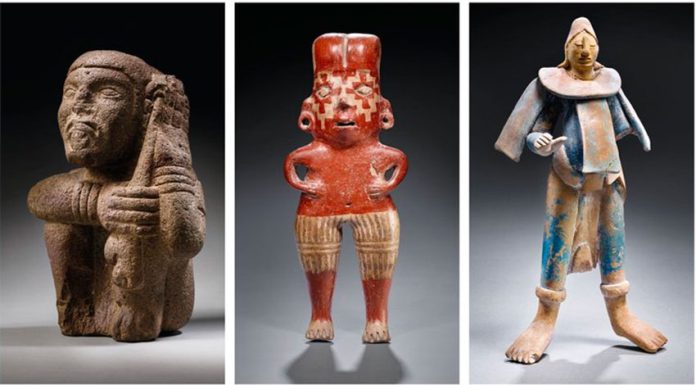An auction of archaeological artifacts in Paris has once again raised the ire of the Mexican government, which has long argued that relics that rightfully belong to Mexico are being sold off illegally in the French capital.
The auction house Christie’s has scheduled an auction of 39 Mesoamerican and Andean works from “a notable European collection” for February 9.
Among the lots, referred to collectively as the “Quetzalcóatl, The Feathered Serpent” ensemble, are 33 pieces from Mexico.
The most notable are an 87-centimeter figure of fertility goddess Cihuateótl, which originated in El Zapotal, Veracruz, and has a price guide of 600,000 to 900,000 euros (US $721,000 to $1.08 million) and a Teotihuacán serpentine mask, which is valued at 350,000 to 550,000 euros (US $420,000 to $661,000).
Christie’s said on its website that the mask dates from circa A.D. 450-650 and was part of the collection of Pierre Matisse, youngest son of the famous painter Henri Matisse, for over 50 years.

Daniel Salinas Córdova, a Mexican historian and archaeologist who lives in Germany and is a noted critic of the sale of Mexican artifacts abroad, took to Twitter on Friday to denounce the auction.
He also noted that the National Institute of Anthropology and History (INAH), the Ministry of Foreign Affairs (SRE) and the Mexican Embassy in France had not made any comment on the upcoming auction.
Hours later, the embassy tweeted back to Salinas and thanked him for “highlighting the negative impact of these private sales.”
The embassy said that on instructions of the SRE, it had submitted a request asking for the auction to be stopped and for the origin of the pieces, “which are assets of Mexico,” to be evaluated.
Writing on his blog, Salinas said that “as expected” the provenance of the pieces, made by indigenous pre-colonial cultures including the Maya, Mexica, Toltec and Teotihuacán and which will go under the hammer next Tuesday, is “gray and unclear.”
“Although there is often a small history of the previous owners and collections to which the pieces ‘belonged’, it is not clear when and under what circumstances the pieces left their places of origin,” he wrote.

“At least in the Mexican case, these artifacts are part of the country’s national heritage, regardless of whether they were subtracted from the country before 1970 and therefore remain outside the temporality covered by the multiple international treaties and conventions against smuggling of cultural property such as UNESCO’s from 1970.”
Salinas said that auctions like the one to be held next week are “unethical and of doubtful legality,” adding that they are “something very serious since they promote the commercialization and privatization of cultural heritage, prevent the study, enjoyment and dissemination of the artifacts and promote archaeological looting.”
After the Mexican Embassy in France said that it has asked for the auction to be stopped, INAH announced it had filed a complaint against it with the Mexicoan Attorney General’s Office (FGR).
“We will continue the fight against the illegal trafficking of cultural assets and for the recovery of Mexican heritage abroad,” INAH director Diego Prieto said on Twitter. “Traders and collectors are sheltering in the permissive laws that prevail in other countries.”
Prieto said in an interview that Mexican archaeological artifacts belong to the nation and that putting them up for sale is prohibited in Mexico. He said that INAH is working with the FGR and the SRE and would try to stop the February 9 auction and have the Mexican pieces returned to Mexico.
“But, … it’s very complicated because we face a legal disparity. We don’t want war with any country, we’re going to respect their laws but we’ll also question them and try to find the legal intricacies that allow us to win this battle,” Prieto said.

He said that France assumes that items put up for sale by auction houses have been acquired in “good faith” and doesn’t question their origin whereas Mexico demands they have an “honest and legitimate origin.”
Prieto added that Mexico is working to reach agreements with France to stop the illegal trafficking of cultural artifacts.
“We were very hopeful about the statements of [French] President Emmanuel Macron, in the sense that France was going to be a country very inclined to the recovery of the heritage assets of other countries …but that hasn’t happened because of bureaucracy,” Prieto said.
“We need the French state to establish legislation … that is more amenable to the recovery of our assets. … They’ve said it with words, what we need is to see it with actions,” he said, adding that Mexico is prepared to fight to get its cultural relics back.
“The fact that something has a high degree of difficulty doesn’t mean that we won’t do it. It’s not easy but we have to keep fighting because these [cultural] goods are national treasures for us. In Mexican laws, the very fact that these pieces are in Paris, in France, in a territory distinct from their origin, is already a crime given that Mexican legislation establishes that the archaeological assets of Mexico are the inalienable and imprescriptible property of the nation.”
Mexico has previously tried to stop auctions of pre-Hispanic artifacts in Paris but failed. INAH has, however, recovered Mexican artifacts from other countries including Italy, Germany and the United States.
Source: Infobae (sp), El Comentario (sp)
